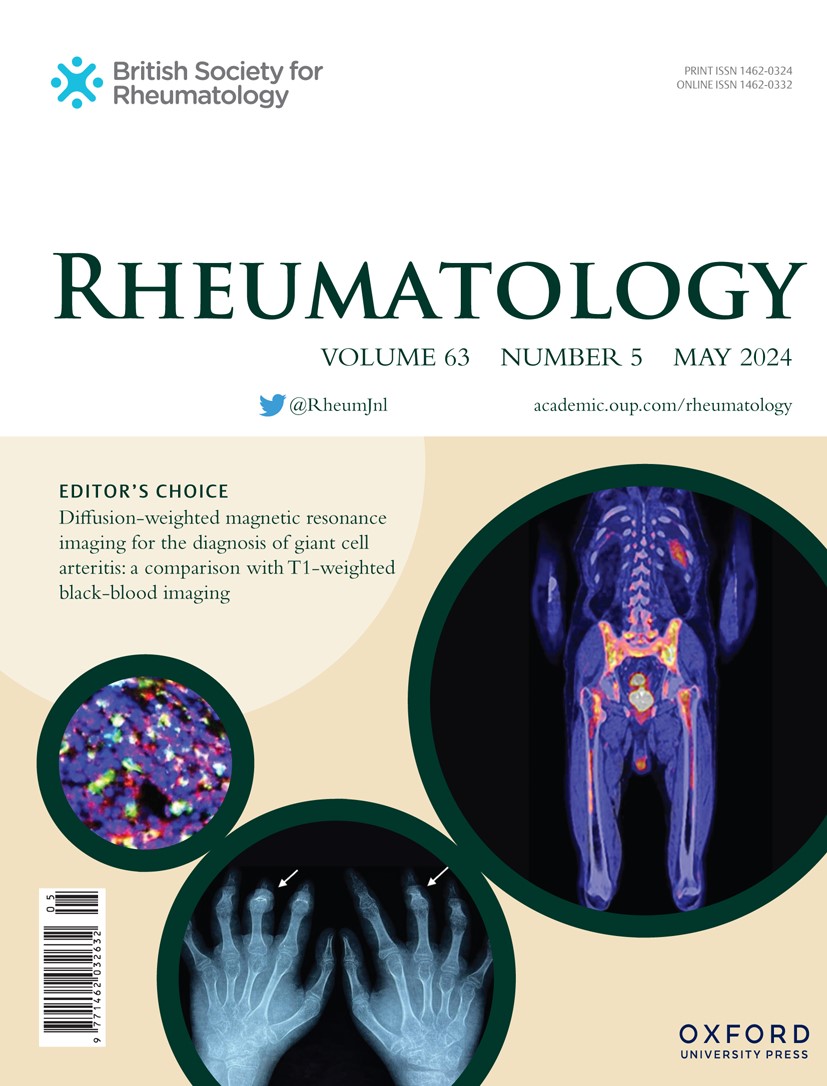E065 The importance and challenges of continuing to use data beyond the age of 16 years old in research
IF 4.7
2区 医学
Q1 RHEUMATOLOGY
引用次数: 0
Abstract
Background/Aims Many childhood-chronic conditions, such as juvenile idiopathic arthritis (JIA), can continue into adulthood. Investigating long-term outcomes for patients is vital to generate a bigger picture of the clinical, physical, social, and psychological impact of chronic conditions over time. When children and young people contribute to research, a parent/guardian will sign the consent form at enrolment. Studies can then be linked with NHS national datasets (hospitalisations/cancers/death) for a more complete picture of a patient’s journeys within healthcare. However, without additional patient consent, linkage must stop at 16 years old, and there are no straightforward mechanisms within the research ethics framework to continue linkage. Methods There is growing concern and confusion around why data collected post-16 years old may not be used in research without explicit consent. Re-consent might not be possible at this point for several reasons. Firstly, the person may have been discharged from clinic as they are in remission. Secondly, they may have moved to an adult rheumatology centre that does not want/is not sufficiently resourced to participate in research. Finally, there may be personal circumstances (financial/educational/personal) which mean they are not able to continue within research but would like their data to still be used. This may be particularly relevant to people from more deprived areas, or ethnic minority groups, as data suggests people from more deprived groups are less likely to continue into adult services. By stopping data linkage at age 16 years, research into adults with JIA would be at increased risk of excluding data from individuals that are in remission, from under-resourced NHS trusts, from more deprived areas, or from minority/other under-represented backgrounds. Results If linkage could be continued for all patients, regardless of additional consent, this bias could be avoided, meaning research outputs are more applicable to all people living with JIA. Feedback from patients and families highlight that they “would not expect to be asked to reconsent”, and instead “assume this consent/linkage would continue into adulthood”, regardless of when they (or their guardian) gave initial consent. Some are even “surprised and disappointed to hear that their data are not being used in a way they believe it should be”. There are real concerns around losing important data, with some families highlighting that “not linking information that is already available would mean there is a black hole once someone becomes an adult”. Conclusion We are advocating for all data linkage to continue beyond 16 years of age without the need for additional consent. We want all experiences to be accounted for, regardless of hospital or background. Through this initiative, we want to ensure that paediatric and young people’s research remains a priority and receives the same amount of attention as equivalent research in adult-only conditions. Disclosure L. Kearsley-Fleet: None. J. Leslie: None. N. Shaw: None. M. Johnson: None. K.L. Hyrich: None. J.H. Humphreys: None.E065在研究中继续使用16岁以上数据的重要性和挑战
背景/目的许多儿童期慢性疾病,如幼年特发性关节炎(JIA),可以持续到成年。调查患者的长期结果对于长期了解慢性疾病的临床、身体、社会和心理影响至关重要。当儿童和青少年参与研究时,家长/监护人将在报名时签署同意书。然后,研究可以与NHS国家数据集(住院/癌症/死亡)联系起来,以更全面地了解患者在医疗保健领域的经历。然而,如果没有额外的患者同意,连接必须在16岁时停止,并且在研究伦理框架内没有直接的机制来继续连接。在没有明确同意的情况下,为什么16岁以后收集的数据不能用于研究,这一点越来越令人担忧和困惑。由于几个原因,此时可能不可能重新同意。首先,患者可能已经出院,因为他们处于缓解期。其次,他们可能已经转移到一个成人风湿病中心,该中心不希望/没有足够的资源来参与研究。最后,可能会有个人情况(经济/教育/个人),这意味着他们无法继续进行研究,但希望他们的数据仍然被使用。这可能与来自较贫困地区或少数民族的人特别相关,因为数据表明,来自较贫困群体的人不太可能继续接受成人服务。通过在16岁时停止数据链接,对JIA成人的研究将增加排除来自缓解期个体、来自资源不足的NHS信托、来自更贫困地区或少数民族/其他代表性不足背景的数据的风险。如果可以在所有患者中继续进行联系性研究,而不需要额外的同意,则可以避免这种偏倚,这意味着研究结果更适用于所有JIA患者。来自患者和家属的反馈强调,他们“不会期望被要求重新同意”,而是“假设这种同意/联系将持续到成年”,无论他们(或他们的监护人)何时最初同意。一些人甚至“听说他们的数据没有被以他们认为应该的方式使用,感到惊讶和失望”。人们确实担心丢失重要数据,一些家庭强调,“如果不把已有的信息联系起来,就意味着一旦一个人长大成人,就会有一个黑洞”。我们提倡所有数据链接在16岁以后继续进行,而无需额外的同意。我们希望所有的经历都能被考虑在内,无论医院或背景如何。通过这一举措,我们希望确保儿科和年轻人的研究仍然是一个优先事项,并得到与仅针对成人的同等研究相同的关注。科尔斯利-弗利特:没有。莱司利:没有。N.肖:没有。约翰逊先生:没有。K.L.海里希:没有。j·h·汉弗莱斯:没有。
本文章由计算机程序翻译,如有差异,请以英文原文为准。
求助全文
约1分钟内获得全文
求助全文
来源期刊

Rheumatology
医学-风湿病学
CiteScore
9.40
自引率
7.30%
发文量
1091
审稿时长
2 months
期刊介绍:
Rheumatology strives to support research and discovery by publishing the highest quality original scientific papers with a focus on basic, clinical and translational research. The journal’s subject areas cover a wide range of paediatric and adult rheumatological conditions from an international perspective. It is an official journal of the British Society for Rheumatology, published by Oxford University Press.
Rheumatology publishes original articles, reviews, editorials, guidelines, concise reports, meta-analyses, original case reports, clinical vignettes, letters and matters arising from published material. The journal takes pride in serving the global rheumatology community, with a focus on high societal impact in the form of podcasts, videos and extended social media presence, and utilizing metrics such as Altmetric. Keep up to date by following the journal on Twitter @RheumJnl.
 求助内容:
求助内容: 应助结果提醒方式:
应助结果提醒方式:


